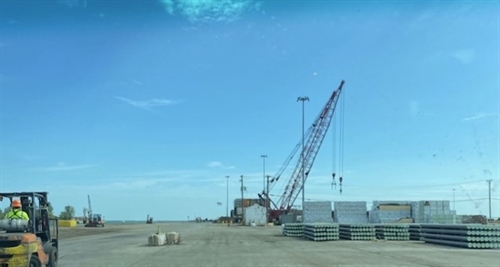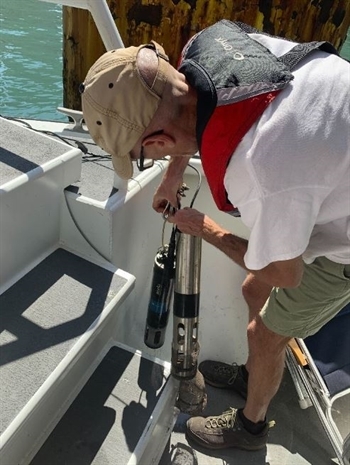Since 2018, the Metropolitan Planning Council has been highlighting the progress of riverfront projects funded through The Chicago Community Trust’s support for Great Rivers Chicago and the Our Great Rivers vision. So far, 25 projects have been supported by The Trust, and are continuing to make major changes throughout the river system. Learn more about these projects in MPC’s interactive story map.
Many residents along Chicago’s rivers have suffered from a lack of information about water quality as well as the inability to safely access their rivers and riverfronts. Initiatives led by the Delta Institute and Current—two organizations funded by the Chicago Community Trust Our Great Rivers grant program—are working with communities and stakeholders to address the environmental pollutants and the water quality information gap to expand access to Chicago’s waterways.
Delta Institute: Stormwater Wetlands Treatment at the Illinois International Port District (IIPD)

Loading docks in the Illinois International Port District Image Courtesy of Delta Institute
Delta Institute (Delta) is partnering with the Illinois International Port District (IIPD) and the Chicago Metropolitan Agency for Planning (CMAP) to implement key recommendations from the 2022 IIPD Master Plan: grow sustainable industrial activities, develop publicly accessible recreation opportunities, and engage community voices. The IIPD is a major landowner in Illinois, with the port stretching across 1,800 acres that includes Lake Calumet on Chicago’s southeast side. The Port is made up of active industry uses as well as underutilized land that is brimming with environmental, social, and economic potential.
Delta will partner with IIPD to implement the Port Master Plan goal of launching an IIPD Community Advisory Team (CAT), which will guide the community engagement process. (Delta Institute has collaborated with communities to address locally-identified needs since 1998!). In this initial stage, Delta will facilitate CAT meetings with community stakeholders to identify and prioritize sites and conduct a feasibility study for establishing green infrastructure (primarily stormwater treatment wetlands) in the Port. Treatment wetlands are a nature-based solutions tool that can filter runoff water from polluting industrial areas before it reaches Lake Calumet or the Calumet River. As the project continues, Delta will utilize the feasibility study for preliminary conceptual designs of treatment wetlands in tandem with other port area projects (like the Lake Calumet Trail and the Square Marsh Park restoration) that support economic development and expand recreational access to create a more sustainable IIPD.
Current: H2NOW

Current and Metropolitan Water Reclamation District of Greater Chicago installing Proteus Probes in Chicago River’s Main Stem Image Courtesy of Current
Current’s project, H2NOW, is in its third year of providing real time, publicly accessible water quality data on Chicago’s rivers in partnership with the Metropolitan Water Reclamation District of Greater Chicago (MWRD), the Chicago Department of Public Health, Urban Rivers, Friends of the Chicago River, Northwestern University, SETF, Proteus/RS Hydro, and OHM Advisors, among other partners. H2NOW is the first real-time water quality monitoring platform of its kind in the US. Prior to the launch of H2NOW, it was difficult to be an informed river user and know whether the river was safe for human contact in real time because of the long processing times for testing and water quality samples. Public understanding of water quality is more important than ever as more frequent climate events lead to microbial water contamination. With H2NOW’s innovative, microbial pollutant-sensing technology, anyone can go to Current’s Real-Time Water Quality Monitoring page to assess the safety of the water along any of the probe locations in the Chicago River’s Main Stem, North Branch, and South Branch, and now the Calumet River. Aligned with this work, MWRD has also recently expanded the number of sites where it operates a continuous dissolved oxygen monitoring program. They recently added 10 telemetry sites and now have 19 real-time monitoring stations throughout the system.
H2NOW recently expanded to include a new probe in the Calumet River. This new site near Blue Island is more accessible than other probes, offering an opportunity to for the public to more easily see and learn about the technology. Educating the public on water monitoring technology and how it can solve water challenges is key to Current’s mission. Aligned with this mission, Current established River Lab, a water-STEM focused high school curriculum in partnership with Chicago Public Schools. River Lab educates students on water monitoring technology and water quality, and nurtures awareness of job opportunities in the blue economy. Through Current’s innovative water quality monitoring and community education, they aim to foster more informed, productive, and safer use of Chicago’s rivers for recreational, environmental, and economic purposes.
Read more about H2NOW in the Chicago Tribune.
Our Great Rivers Grant Program
Through community and stakeholder partnerships and innovative technology, Delta and Current are promoting public understanding of water quality and expanding access to the recreational, environmental, and economic opportunities Chicago’s rivers provide. MPC is excited about the potential impact of these two projects to shape how communities interact with their rivers. This is the first in our series where we will highlight the projects that are included as part of the Our Great Rivers grant program. Stay tuned for future updates about all these projects.
Looking for information about past Our Great Rivers grantees? Find the summary pages for those years here: